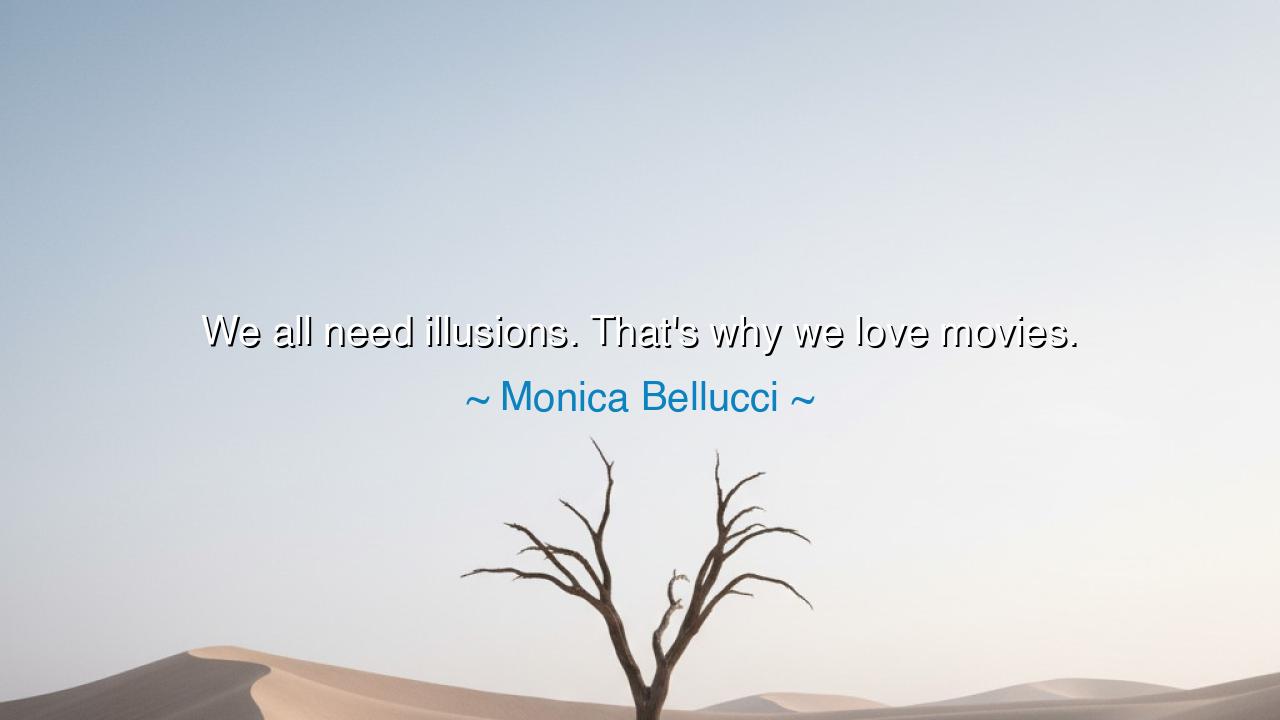
We all need illusions. That's why we love movies.






Hear the words of Monica Bellucci, actress of grace and depth, who unveiled a truth not only about art but about the human soul itself. She declared: “We all need illusions. That’s why we love movies.” These words are not the idle musings of a performer, but the confession of a timeless necessity: that humanity, though bound by reality, cannot survive upon reality alone. We thirst for dreams, for visions, for worlds beyond our own. Without them, our spirit withers; with them, our hearts take flight.
When Bellucci speaks of illusions, she does not mean falsehoods that deceive, but visions that sustain. Life, with its weight of sorrow, toil, and disappointment, can grind the heart into dust. The movies, with their light and shadow, remind us that beauty, love, and triumph are still possible. These illusions are not lies—they are mirrors of what the soul longs for, and in them we find courage to face the truth of our daily existence. Illusion becomes medicine, not poison, when it lifts us, consoles us, and inspires us.
The origin of this wisdom lies in the ancient role of storytelling. Before there were screens, there were fires, and around those fires, bards and poets wove their illusions. They told of heroes who defied the gods, of lovers who crossed impossible distances, of kingdoms that rose and fell like waves. Were these tales “real”? No—but they gave strength to the weary, meaning to the suffering, and hope to the lost. In this way, movies are the heirs of myth, offering us the illusions we still need, clothed in the garments of modern art.
History confirms this truth. In the dark days of the Great Depression, when despair stalked the land, millions found refuge in the movies. Musicals, comedies, and romances lifted spirits, not because they reflected harsh reality, but because they gave illusions of joy, of laughter, of possibility. To the weary, those two hours in the cinema were not lies—they were survival. They gave strength to endure another day. The illusion became as vital as bread, for the human heart feeds not only on food, but on hope.
The deeper meaning is that illusions are part of the fabric of faith itself. What is religion, if not the vision of a reality beyond the visible? What is love, if not the daring belief that two souls can find eternity in each other? What is ambition, if not the illusion that tomorrow may be greater than today? These illusions are not delusions—they are the creative fire that lifts humanity above mere survival. To embrace them is to honor the imagination that makes us human.
Beloved listener, take this wisdom into your life. Do not scorn illusions, nor think them childish. Cherish them, for they are the wellsprings of joy and resilience. Allow yourself to be moved by movies, by stories, by dreams that seem larger than life. They are not meant to trick you, but to awaken in you the strength to bear reality with greater courage.
Therefore, in your own days, create space for illusions. Watch a film that lifts your heart, read a tale that fills your spirit, dream dreams that seem impossible. For these are not escapes from life, but companions that enrich it. Just as Bellucci reminds us, we all need illusions—not to blind us, but to remind us of who we are, and who we yet might become.
Thus her words endure as a gentle but powerful teaching: that in the realm of movies, in the dance of illusion, lies the nourishment of the soul. Embrace it, for it is not a weakness to love illusions—it is a strength, a testament that even in a harsh world, the human heart still dares to dream.






AAdministratorAdministrator
Welcome, honored guests. Please leave a comment, we will respond soon